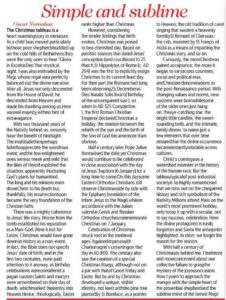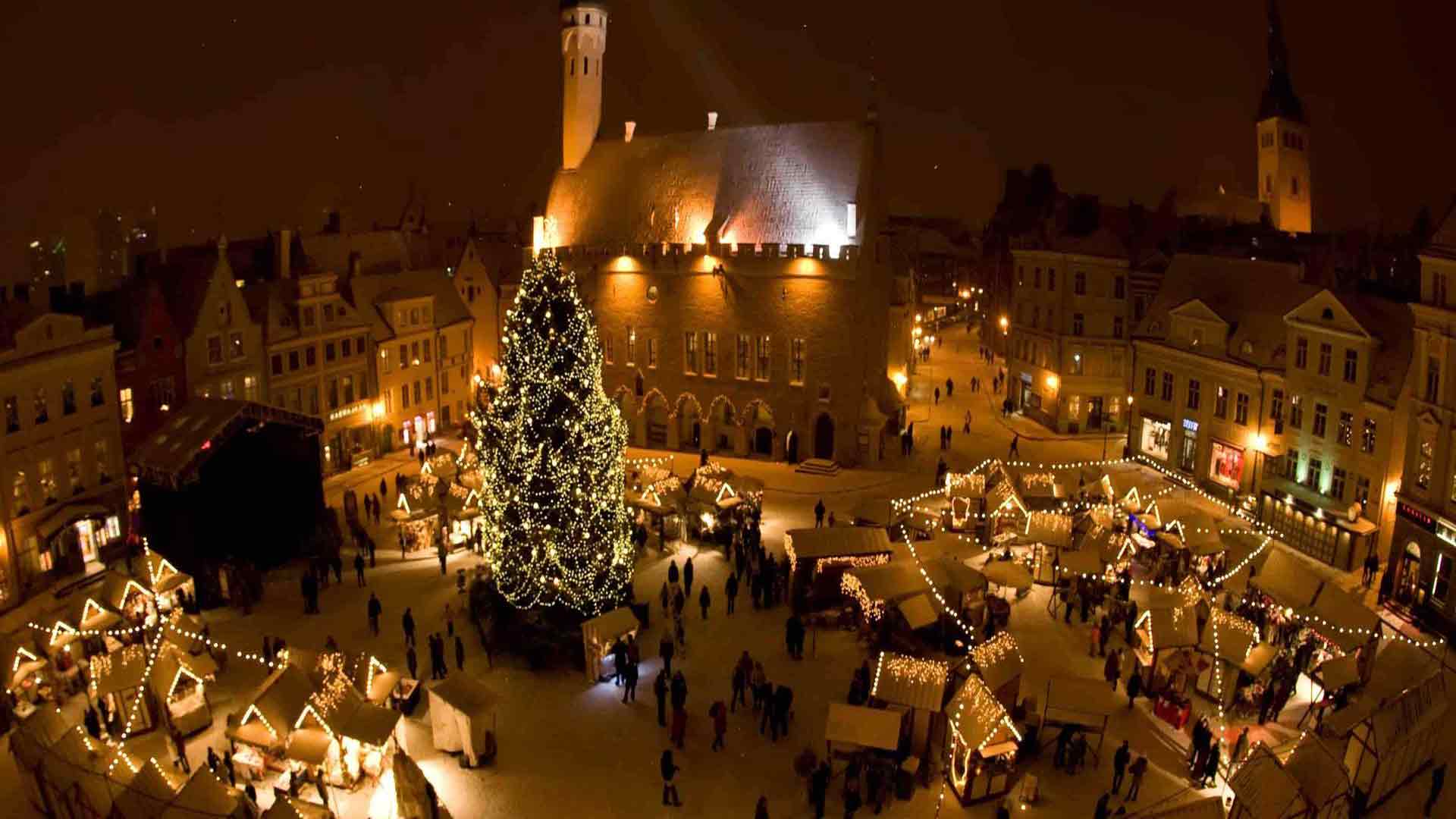When the soul feels its worth…
 Does the run-up to Christmas sometimes feel like a wild-goose chase? When the painters don’t show up; the newest dress catalogue is a let-down; the much-awaited mechanized crib is a non-starter, and there’s no Christmas tree and star worth the name in the city shops... As if that weren’t enough, there’s no turkey in town, and we have to literally start chasing geese!
Does the run-up to Christmas sometimes feel like a wild-goose chase? When the painters don’t show up; the newest dress catalogue is a let-down; the much-awaited mechanized crib is a non-starter, and there’s no Christmas tree and star worth the name in the city shops... As if that weren’t enough, there’s no turkey in town, and we have to literally start chasing geese!
‘A poor life this if, full of care, we have no time to stand or stare,’ W. H. Davies would say. Alas, the weariness, the fever and the fret increases by leaps and bounds as we draw closer to Christmas. There’s a mad rush online, long queues at the mall, frightening street jams, hullabaloo at home. It is as though the celebration is an end in itself.
Isn’t Advent supposed to be a time of expectant waiting and preparation for the Nativity of Jesus? Flippant though it may sound, today it’s more about waiting for Flipkart orders to arrive and set the tone for the Christmas preparation. Where, then, is that time to stand and contemplate the Babe of Bethlehem?
They say the best part of the celebration lies in waiting for it; but that’s only for those who can wait! On four Sundays preceding Christmas, candles are lit, representing hope, faith, joy and peace, all part of a tradition rich in symbolism. Sadly, with a decline in our capacity for spiritual expectancy and enjoyment, we simply gloss over those milestones. We are a generation of instant, material gratification.
It would be interesting to figure out how to spend this time of the year more meaningfully. To my mind, the accent should be on being ourselves rather than doing a million things. For sure, we must have put up the crib, the tree, the decorations; we do need the bells, the light and the music; and without the gifts and the family dinner, Christmas may feel incomplete.
But then, these acts should be symbolic of our self-giving to the Child Jesus; they should not be about self-serving. Those acts should finally translate into works of love towards our fellow human beings, and not make us complacent.
Pope Francis’ recent exhortation on how to spend Christmas is reassuring: we have to incarnate Christmas. For instance, one way to personify the Christmas pine is to resist life’s vigorous winds. We will bring alive the Christmas decorations when an array of virtues adorn our life. Jingling bells must be an invitation to one and all to gather and feel as one.
There is no doubt that the angel, the star and the Magi are some of the most enduring images of the Christmas tableau. Like the angel who sang ‘Gloria in Excelsis Deo’, we have to be harbingers of peace, justice and love. We have to be a guiding star to persons seeking the true God. In all that we do, we have to do as the Wise Men did: give the best of ourselves to the Lord.
When our being is one harmonious whole, our voices will produce the joyous music of Christmas. We will become instruments of peace and harmony in society. We will be the light of Christmas, illuminating others’ path with kindness, patience, joy and generosity. Our life will be a gift to everyone in need. The season’s greeting cards will magically convey our tender love and care.
And when everything is said and done and our Christmas dinner is underway – shared with someone who has no dinner to share with us – we will experience the presence of the Divine Infant in our midst. That night will be an expectant waiting and preparation for a new dawn, a new hope, a new life... Then there’ll be no wild-goose chase; we will be at peace with ourselves, thankful to God for what we are and what He has given us. Focused on Christ, we will be the salt of the earth and the light of the world.
Eventually, thoughts of how life had been a mad, mad rush in the bleak mid-winter, that is, “till he appeared, and the soul felt its worth,” will warm the cockles of our heart. From then on, every day it will be Christmas.
(The Goan, 25.12.2019)
Simple and Sublime
 The Christmas tableau is a heart-warming story in miniature. As a child I was moved particularly by those poor shepherds huddled up on the cold hills of Bethlehem; they were the only ones to hear “Gloria in Excelsis Deo” that mystical night. I was also enthralled by the Magi, whose regal aura perfectly balanced out the divine narrative. After all, Jesus not only descended from the House of David, he descended from Heaven and made his dwelling among us. Here was real majesty, with no hint of extravagance.
The Christmas tableau is a heart-warming story in miniature. As a child I was moved particularly by those poor shepherds huddled up on the cold hills of Bethlehem; they were the only ones to hear “Gloria in Excelsis Deo” that mystical night. I was also enthralled by the Magi, whose regal aura perfectly balanced out the divine narrative. After all, Jesus not only descended from the House of David, he descended from Heaven and made his dwelling among us. Here was real majesty, with no hint of extravagance.
With two thousand years of the Nativity behind us, we surely have the benefit of hindsight. The multitude then perhaps failed to appreciate the wondrous event; and the few enlightened ones were so meek and mild that the likes of Herod exploited the situation, apparently frustrating God’s plans for humankind. The king and his minions even drove Christ to his death but, thankfully, his resurrection soon became the very foundation of the Christian faith.
There was a mighty coherence to Jesus’ life story. His rise from the tomb established his reputation as a Man-God. Were it not for Easter, Christmas would have gone down in history as a non-event. In fact, the Bible does not specify Jesus’ date of birth; and in the first two centuries, none paid attention to it anyway, as birthday celebrations were considered a pagan custom. Saints and martyrs were remembered on their day of death, which marked their entry into Heaven. Hence, theologically, Easter ranks higher than Christmas.
However, considering the tender feelings that birth evokes, Christmas was poised to be a cherished day. Based on patristic sources that dated Jesus’ conception (and crucifixion) to 25 March, St Hippolytus of Rome (c. AD 204) was the first to explicitly assign Christmas to its current feast day. For their part, the Romans had long been observing 25 December as Dies Natalis Solis Invicti (‘birthday of the unconquered sun’), so when in AD 325 Constantine I, the first Roman Christian Emperor, declared Christmas a holiday, the relation between the rebirth of the sun and the birth of the Son of God became more than obvious.
Half a century later, Pope Julius I formalised the date; yet Christmas would continue to be celebrated in close association with the day of Jesus’ baptism (6 January) for a long time to come. On this day some Eastern Orthodox Christians still observe Christmas side by side with the (revelation of the Infant Jesus to the Magi), while in accordance with the Julian calendar, Greek and Russian Orthodox churches commemorate Christmas on 7 January.
Celebration of Christmas struck root in the medieval ages. It gained impetus with Charlemagne’s crowning on that day in AD 800. The century also saw the creation of a special Christmas liturgy, although not on a par with that of Good Friday and Easter. But by and by Christmas developed a unique, visible identity, not least with the pine tree planted by St Boniface, as a pointer to Heaven; the old tradition of carol singing that was lent a heavenly form by St Bernard of Clairvaux; the crib, invented by St Francis of Assisi as a means of imparting the Christmas story, and so on.
Curiously, the more Christmas gained acceptance, the more it began to vary across countries, social and political eras, and Christian denominations in the post-Renaissance period. With changing values and norms, new customs were born while some of the older ones just hung on: the eye-catching star, the bright little candles, the sweet-sounding bells, and the intimate, family dinner, to name just a few elements that over time ensured that the divine occurrence became instantly relatable across cultures.
Christ’s coming was a watershed moment in the history of the human race. But the tableau typical of post-industrial society is so highly romanticised that we miss out on the chequered history and rich symbolism of the Nativity. Millions attend Mass on the world’s most prominent holiday, only to top it up with a secular, not to say raucous, celebration. Here the divine protagonist is easily forgotten and Santa the antagonist highlighted. In short, we forget the reason for the season.
With half a century of Christmases behind me, I feel more and more concerned about our collective failure to grasp the mystery of the joyous occasion. How I yearn to approach the manger with the simple heart of the proverbial shepherd and the sublime mind of the famed Magi!
(Herald, 23.12.2019)
Christmas as a state of being
Have you noticed that the singing or playing of carols before Advent hardly strikes a chord in our hearts? It’s almost like getting into a sweater on a hot summer’s day!
Hearing people say ‘It doesn’t feel like Christmas just yet’ makes one wonder what really gets in the way of enjoying a Christmassy feeling through the year. Yes, maybe we need a few props – the bright star, the colourful decorations, the rustic crib, the delicious home-made sweets, the joyful carols and the festive clothes… even the nippy weather – to get into the mood. But should our feeling, thinking, or being be governed by externals alone?
It’s time we realized that several agencies out there are vying for our time and attention: the merchants, who dangle their goodies before our eyes – pushing us into a ‘commercial’ Christmas; and now the environmentalists, too, wrangling about all that – pressing us into an ‘ecological’ Christmas. Besides, there are the age-old secularists, or say, those without any religious principles, for whom all is grist that comes to their mill…. They are all sources of great distraction for the young and old, the rich and the poor, the educated and the uneducated alike.
For our part, why not respond intently to our basic calling, which is to herald a ‘spiritual’ Christmas? By this we mean giving priority to the life of the spirit, rather than to material concerns; seeking to reconcile with God and to reach out to our neighbour; and giving to Christ the place that rightly belongs to Him in our hearts and minds. At Christmas we are called to truly light up the virtues of faith, hope and charity; it’s a special time to don God’s (and not Santa’s) thinking cap. And then, as we stop to contemplate the face of the Little Babe, Our Lord and Saviour, the worldly delights of a winter wonderland will vanish and overriding concerns about our Planet pale into insignificance.
If we have had fake Christmases in the past, let us put them behind us and move on; let us turn a new leaf, setting sights on a genuine Christmas and a radiant New Year. The tender spirit of December will not evaporate – and thus our world will be a better place – if Christmas isn’t limited to a day; if all mothers become like Mary and fathers like Joseph, and if we all model ourselves on Jesus of Nazareth….
And that’s probably when the singing or playing of carols will begin to strike a chord in our hearts right through the year!
(Editorial, The Stella Maris Bulletin, Vol. 3, No. 2, Dec 2009)


